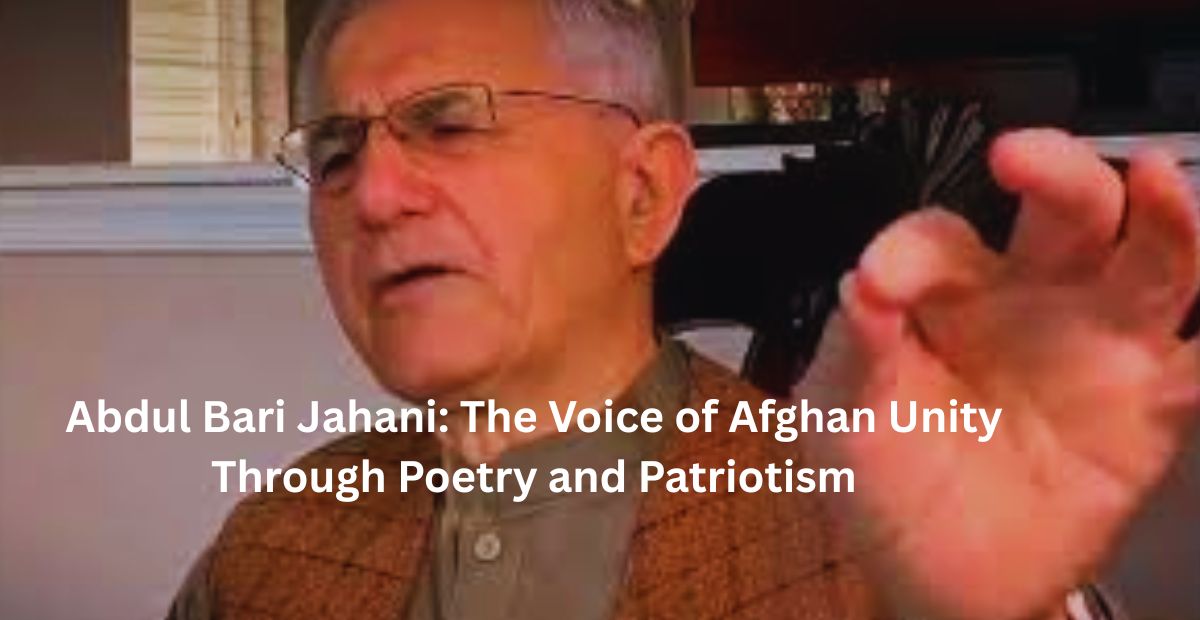Abdul Bari Jahani (Pashto: عبدالباري جهاني), born on 14 February 1948 in the historic Ahmad Shahyee area of Kandahar city, is one of Afghanistan’s most influential poets, novelists, historians, and journalists. A literary legend and cultural icon, Jahani is best known for penning the lyrics of the national anthem of the Islamic Republic of Afghanistan and for his timeless contributions to Pashto literature.
Early Life and Education
Growing up in the vibrant and peaceful city of Kandahar, Jahani experienced firsthand the diversity and coexistence of Afghan society. His fond memories of youth are immortalized in his famous book Raazo-Niyaaz, where he reflects on Kandahar’s peaceful past and its rich cultural fabric.
He graduated from Mirwais Nika High School, one of the most reputable schools in southern Afghanistan. Since Kandahar University had not yet been established, Jahani chose to pursue higher education at Kabul University, where he graduated in 1972 with a Bachelor’s degree in Pashto Literature and History.
Ethnic Identity: A Matter of Debate
Jahani’s ethnic background remains uncertain. Some sources suggest he is from the Ludin tribe, while others associate him with the Hotak sub-tribe of the Ghilzai Pashtuns. Interestingly, prominent Afghan economist Ustad Said Masoud claims Jahani is actually of Tajik origin from Ghazni province. Despite the speculation, Jahani has always emphasized Afghan unity and diversity, seeing strength in the nation’s multi-ethnic identity.
A Flourishing Career in Literature and Media
After graduation, Jahani joined Pashto Tolana, the country’s premier literary body, comparable to the Harvard Law Review in prestige. He played a significant role in enriching Pashto vocabulary and standardizing the language for modern usage.
He later became the Managing Editor of Kabul Magazine, significantly increasing its readership and influence. His work in the Afghan Ministry of Education was cut short due to the Soviet invasion, which forced him into exile.
Life in Exile and Rise as a Voice of the Afghan Diaspora
Jahani lived as a refugee in Pakistan before moving to the United States, where he joined the Voice of America (VOA) in 1983. At VOA, Jahani hosted various programs including political talk shows and literary segments. His late-night poetry show “Da Ashnayaano Adabi Dera” became wildly popular among Pashto-speaking audiences across South Asia and the Middle East.
His iconic poem “Three Cows and One Wolf”, told in poetic form, carries a deep message of unity and is beloved across generations.
Literary Contributions: Modern-Day Rahman Baba
Often referred to as the contemporary Rahman Baba or Khushal Khan Khattak, Jahani’s poetry addresses themes of romance, patriotism, bravery, and enlightenment. Some of his most well-known poetry collections include:
- Moshko Karwaan (د مشکو کاروان)
- Wraka Mayna (ورکه مېنه)
- Razo-Niyaaz (رازو نیاز)
- Da Sabawoon Pa Tama (د سباوون په تمه)
- Shpelai (شپېلۍ)
- Paikob (پایکوب)
- Koi Toor (کوه طور)
- Kawsar (کوثر)
Jahani has also translated works from Persian and English into Pashto, further enriching the language’s literary landscape.
The National Anthem and Role in the Afghan Constitution
In 2006, at the request of President Hamid Karzai, Jahani composed the lyrics for Afghanistan’s new national anthem, which was officially adopted by the Loya Jirga. He also played an advisory role in drafting Afghanistan’s 2004 Constitution.
A Champion of Unity, Education, and Anti-Corruption
Throughout his life, Jahani has promoted education, unity, and national pride. He has remained politically neutral but vocal, supporting Dr. Ashraf Ghani in the 2009 presidential elections and refusing to run for office despite public support.
He is known for his anti-corruption stance, which strained his long-standing friendship with former President Karzai, especially after endorsing Karzai’s rival, Ashraf Ghani.
Controversy and Criticism
While celebrated by many, Jahani has also faced criticism. Some accuse his epic-style poetry of encouraging war and violence. However, his supporters argue that his work promotes peace, unity, and resistance against tyranny.
One of his most debated poems, a dialogue between a suicide bomber and his mother, sparked national discourse. Critics questioned its intent, but many viewed it as a powerful anti-extremism message, emphasizing maternal love and humanity.
Influence on Music and Popular Culture
Jahani’s poetry has been adapted into music by renowned Afghan artists including:
- Dr. Fetrat Nashnas
- Farhad Darya
- Waheed Qasemi
- Waheed Saberi
- Bashir Maidani
His poem-turned-song “Nasihat”, performed by Bashir Maidani, became especially popular among Pashtuns worldwide.
Conclusion: Abdul Bari Jahani’s Legacy
Abdul Bari Jahani is more than a poet—he is a symbol of Afghan resilience, cultural identity, and national unity. Through his pen, he has bridged generations, connected ethnic divides, and preserved the soul of a nation in verse. His legacy continues to inspire Afghans both at home and across the globe.
Tags: #AbdulBariJahani #AfghanPoetry #PashtoLiterature #AfghanNationalAnthem #AfghanWriters #VoiceOfAmerica #Kandahar #PashtoPoet #AfghanUnity #AntiCorruption #AfghanHistory
